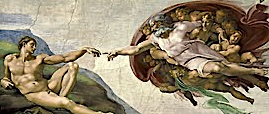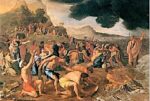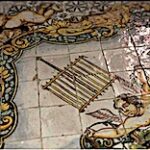Image: The Creation of Adam by Michelangelo x.1512 in Sistine Chapel
Pope Francis’ message for the world day of prayer for the care of creation – 1st September 2024
“Hope and Act with Creation”
Scriptural Reference – Romans (8:19-27)
19 For the creation waits with eager longing for the revealing of the sons of God;
20 for the creation was subjected to futility, not of its own will but by the will of him who subjected it in hope;
21 because the creation itself will be set free from its bondage to decay and obtain the glorious liberty of the children of God.
22 We know that the whole creation has been groaning in travail together until now;
23 and not only the creation, but we ourselves, who have the first fruits of the Spirit, groan inwardly as we wait for adoption as sons, the redemption of our bodies.
24 For in this hope we were saved. Now hope that is seen is not hope. For who hopes for what he sees?
25 But if we hope for what we do not see, we wait for it with patience.
26 Likewise the Spirit helps us in our weakness; for we do not know how to pray as we ought, but the Spirit himself intercedes for us with sighs too deep for words.
27And he who searches the hearts of men knows what is the mind of the Spirit becausethe Spirit intercedes for the saints according to the will of God.
Dear Brothers and Sisters!
“Hope and Act with Creation” is the theme of the World Day of Prayer for the Care of Creation, to be held on 1 September 2024.
The theme is taken from St. Paul’s Letter to the Romans (8:19-25), where the apostle explains what it means for us to live according to the Spirit and he focuses on the sure hope of salvation that is born of faith, namely, the newness of life in Christ.
1. Let us begin with a question, that may not have an immediately obvious answer.
If we are truly believers, how did we come to believe?
It is not simply because we believe in something transcendent, beyond the power of reason, the inaccessible mystery of a distant and remote God, invisible and unnameable.
Rather, as St. Paul tells us, it is because the Holy Spirit dwells within us.
We are believers because the very love of God “has been poured into our hearts” (Rom 5:5) and the Spirit is now truly “the pledge of our inheritance” ( Eph 1:14), constantly urging us to strive for eternal goods, according to the fullness of Jesus’ authentic humanity.
The Spirit enables believers to be creative and active in charity.
He sends us forth on a great journey of spiritual freedom, which, however, does not eliminate the tension between the Spirit’s way of thinking and that of the world, whose fruits are opposed to each other (Gal 5:16-17 –But I say, walk by the Spirit, and do not gratify the desires of the flesh. For the desires of the flesh are against the Spirit, and the desires of the Spirit are against the flesh; for these are opposed to each other, to prevent you from doing what you would).
We know that the first fruit of the Spirit, which sums up all the others, is love.
Guided by the Holy Spirit, believers are children of God and can address him with the words “Abba, Father” (Rom 8:15 – you have received the spirit of sonship. When we cry, “Abba! Father!), just as Jesus did.
And we can do so with the freedom of those who no longer live in fear of death, because Jesus has risen from the dead.
This is our great hope: God’s love has triumphed and continues to triumph over everything.
Indeed, even in the face of physical death, future glory is already assured for those who live the new life of the Spirit. Nor is this hope disappointing, as the recent Bull of Indiction on the forthcoming Jubilee confirmed.
2. The life of a Christian is therefore a life of faith, active in charity and full of hope, as we await the return of the Lord in glory.
We are not concerned about the “delay” of the parousia, (i.e. the second coming of Christ); for us the important question is whether, “when the Son of man comes, he will find faith on earth” (Lk 18:8).
Faith is a gift, the fruit of the Spirit’s presence in us, but it is also a task to be undertaken freely, in obedience to Jesus’ commandment of love. This is the blessed hope to which we must give witness.
But where, when, and how are we to give this witness?
Certainly bycaring for the flesh of suffering humanity.
As people who dare to dream, we must dream with our eyes wide open, driven by the desire for love, fraternity, friendship and justice for all.
Christian salvation enters into the depths of the world’s pain, which includes not only humanity but the entire universe, nature itself, and the oikos (i.e. the family and the family’s house), the home and living environment of humanity.
Salvation embraces creation as an “earthly paradise,” Mother Earth, which is meant to be a place of joy and a promise of happiness for all.
Our Christian optimism is based on a living hope: recognises that all things are ordered to the glory of God, to the final fulfilment in his peace and to the bodily resurrection in righteousness, as we pass “from glory to glory.”
Nevertheless, in the course of time we are not exempt from pain and suffering: the whole creation groans , we Christians groan, and the Spirit himself groans. (Scriptural Reference – Romans 8:19-27 above)
This groaning expresses anxiety and suffering, as well as longing and desire.
It gives voice to our trust in God and our confidence in his loving yet demanding presence in our midst, as we look forward to the fulfilment of his plan, which is joy, love and peace in the Holy Spirit.
3. The whole of creation is engaged in this process of rebirth and groans for its liberation.
This involves an invisible and imperceptible process of growth.
It is like that of “a mustard seed that becomes a great tree” or “yeast in the dough” (Mt 13:31-33).
The beginnings are tiny, but the expected results can be infinitely beautiful.
As in the anticipation of a birth – the revelation of the children of God – hope is possibility of remaining steadfast in the midst of adversity, of not becoming discouraged in times of tribulation or in the face of human barbarity. Christian hope does not disappoint, nor does it deceive.
The groaning of creation, of Christians and of the Spirit is anticipation and expectation of salvation already at work. We are now immersed in so many sufferings that St Paul describes as “tribulation, distress, persecution, famine, nakedness, peril, sword” ( Rom 8:35).
Hope, then, is an alternative reading of history and human affairs.
It is not illusory, but realistic, with the realism of a faith that sees the invisible.
This hope is patient expectation, like that of Abraham.
I think of that great visionary believer, Joachim of Fiore, the Calabrian abbot who, in the words of Dante Alighieri, “was endowed with a spirit of prophecy”
At a time of violent conflicts between the Papacy and the Empire, the Crusades, the outbreak of heresies and growing worldliness in the Church, Joachim was able to propose the ideal of a new spirit of coexistence between people, based on universal fraternity and Christian peace, the fruit of a life lived in the spirit of the Gospel.
I spoke of this spirit of social friendship and universal fraternity in Fratelli Tutti, but this harmony between men and women should also be extended to creation, in a “situated anthropocentrism” ( Laudate Deum, 67) and in a sense of responsibility for a humane and integral ecology, the way to salvation for our common home and for us who inhabit it.
4. Why is there so much evil in the world?
Why so much injustice, so many fratricidal wars that kill children, destroy cities, pollute the environment and leave Mother Earth violated and devastated?
Implicitly referring the sin of Adam, Saint Paul states: “We know that the whole creation has been groaning in labor pains until now” (Rom 8:22).
The moral struggles of Christians are linked to the “groaning” of creation, ever since the latter “was subjected to futility” (v. 20).
The whole universe and every creature therein groans and yearns “impatiently” for its present condition to be overcome and for its original state to be restored.
Our liberation therefore includes that of all other creatures who, in solidarity with the humanity, have been placed under the yoke of slavery.
Creation itself, like humanity, has been enslaved, although through no fault of its own, and finds itself unable to fulfil the enduring meaning and purpose for which it was created.
It is subject to dissolution and death, aggravated by the human abuse of nature.
At the same time, the redempion of humanity in Christ is also a sure hope for creation, for, “creation itself will be delivered from its bondage to decay and will attain the glorious liberty of the children of God” (Rom 8:21).
Consequently, thanks to Christ’s redemption, it is possible to contemplate with hope the bond of solidarity between human beings and all other creatures.
5. In our hopeful and persevering expectation of the glorious return of Jesus, the Holy Spirit keeps us, the community of believers, vigilant; he constantly guides us and calls us to conversion, to a change in lifestyle in order to resist the degradation of our environment and to engage in that social critique which is, above all. a witness to the real possibility of change.
This conversion means leaving behind the arrogance of those who want to dominate others and nature itself, reducing it to an object to be manipulated, and instead embracing the humility of those who care for others and for the whole of creation.
“When human beings claim to take God’s place, they become their own worst enemies” (Laudate Deum, 73), because Adam’s sin has corrupted our fundamental relationships: with God, with ourselves, with one another and with the universe.
All these relationships need to be integrally restored, saved and “put right”.
None of them can be overlooked, for if even one is lacking, everything else fails.
6. Hoping and acting with creation, then, means above all joining forces and walking together with all men and women of good will. In this way, we can help to rethink, “among other things, the question of human power, its meaning and its limits. Our power has frenetically increased in a few decades.
We have made impressive and awesome technological advances, yet we have not realized that at the same time we have turned into highly dangerous beings, capable of threatening the lives of many beings and our own survival”(Laudate Deum, 28).
Unchecked power creates monsters and then turns against us.
Today, therefore, there is an urgent need to set ethical limits to the development of artificial intelligence, since its capacity for calculation and simulation could be used to dominate humanity and nature, instead of being harnessed for the service of peace and integral development (cf. Message for the World Day of Peace 2024).
7. “The Holy Spirit accompanies us at every moment of our lives”.
This was clearly understood by the boys and girls gathered in St. Peter’s Square for the first World Day of the Child, celebrated on Trinity Sunday.
God is not an abstract concept of infinity, but the loving Father, the Son who is the friend and redeemer of every person, and the Holy Spirit who guides our steps on the path of charity.
Obedience to the Spirit of love radically changes our the way of thinking: from being “predators”, we become “cultivators” of the garden.
The earth is entrusted to our care, but it remains God’s (cf. Lev 25:23).
This is the “theological anthropocentrism” that marks the Judeo-Christian tradition.
To claim the right to possess and dominate nature, to manipulate it at will, is thus a form of idolatry. It is a Promethean version of man who, intoxicated by his technocratic power, arrogantly places the earth in a “dis-graced” state, deprived of God’s grace.
Indeed, if the grace of God is Jesus, who died and rose again, then the words of Benedict XVI certainly ring true: “It is not science that redeems man: man is redeemed by love” (Spe Salvi, 26), – namely, the love of God in Christ, from which nothing and no one can ever separate us (cf. Rom 8:38-39).
Creation, then, is not static or closed in on itself, but is constantly being drawn towards its future. Today, thanks to the discoveries of contemporary physics, the connection between matter and spirit presents itself to our understanding in ever more fascinating ways.
8. The care of creation is therefore not only an ethical question, but also an eminently theological question, since it is the point of intersection between the mystery of man and the mystery of God.
This intersection can be called “creative”, because it has its origin in the act of love by which God created human beings in Christ.
This creative act of God makes possible and grounds the freedom and morality of all human activity.
We are free precisely because we have been created in the image of God, who is Jesus Christ, and are therefore “representatives” of creation in Christ himself.
A transcendent (theological-ethical) motivation commits Christians to promote justice and peace in the world, not least through the universal destination of goods.
It is a matter of the revelation of the children of God for whom creation is waiting, groaning as in the pangs of childbirth.
At stake is not only our earthly life in history, but also, and above all, our future in eternity, which is the eschaton (i.e last act) of our beatitude, the paradise of our peace, in Christ, the Lord of the cosmos, crucified and risen out of love.
9.Hoping and acting with creation then means living an incarnational faith, which knows how to enter into the suffering and hopeful flesh of people, sharing the expectation of the bodily resurrection to which believers are predestined in Christ the Lord.
In Jesus, the eternal Son in human flesh, we are truly children of the Father.
Through faith and baptism, life in the Spirit begins (cf. Rom 8:2).
It is a holy life, lived as children of the Father, like Jesus (cf. Rom 8:14-17), since by the power of the Holy Spirit, Christ lives in us (cf. Gal 2:20).
In this way, life can become a song of love for God, for humanity, with and for creation, and find their fullness in holiness.


